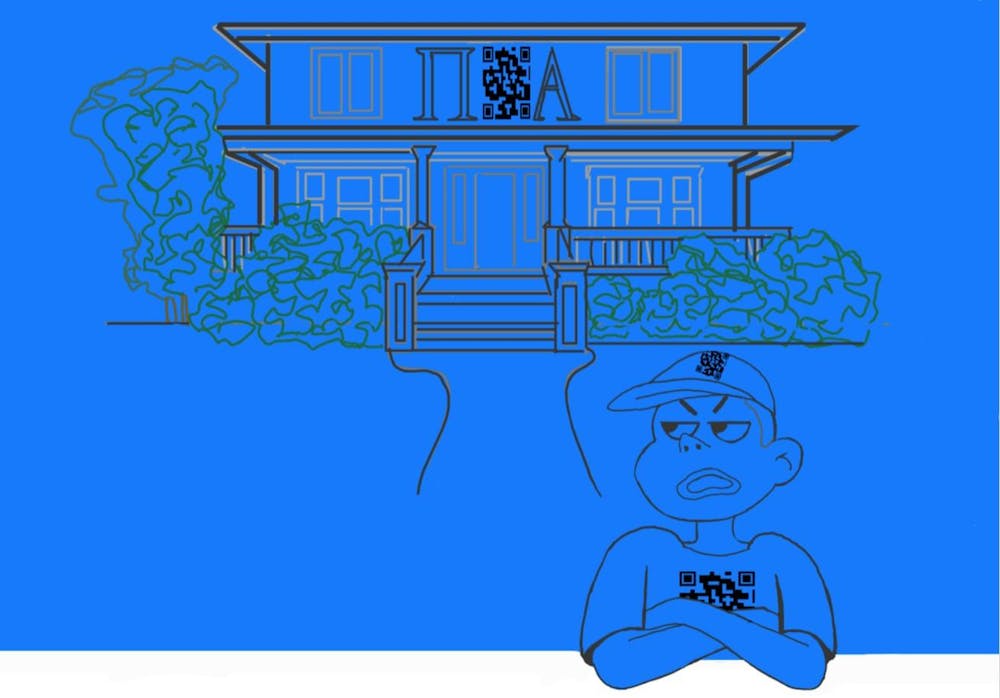Take a look at this photo of Madison Bowl in 1975. Photographed during the University’s iconic Easters celebration, this photo demonstrates how exciting a space like Madison Bowl can be — an open, non-fraternity-owned area which does not require a DoorList invitation for entry. Unfortunately, in recent years, the party scene at the University has lost its way and become more exclusive. With St. Patrick’s Day celebrations hidden behind the bushes of Beta Theta Pi and darties swallowed up inside the confines of St. Anthony’s Hall, feelings of open and accessible social connection have been hard to replicate. The dissemination of the app DoorList has uniquely intensified this issue, and DoorList’s damage to nightlife around Rugby Road must be stopped. DoorLists at fraternities should be replaced by more relaxed methods of invitation that advance an attitude towards maintaining a fun and diverse party culture.
Let me be clear — DoorList complicates every student’s night out. DoorList, the McIntire School of Commerce start-up, began in 2022 with the simple goal of “bringing people together” by minimizing the logistics of wristbands purchased for each party. Wristbands are stricter than most methods for party entry across universities — in contrast, most fraternities just require a guest to name a fraternity brother, be on a door list or simply be a woman. However, at our University, DoorList has infinitely heightened exclusivity. In order to enter a party, all guests must present their unique QR code, provided by the host, to the bouncer. This undoubtedly raises the bar to entry.
Undoubtedly, DoorList was created with good intentions — it was designed as a mechanism to improve safety and security at parties. It allows the hosts of fraternity parties to carefully vet guests and place only approved ones on a list. In short, DoorList was intended to streamline the ability of hosts to guarantee their guests’ safety. However, even with DoorList at the most exclusive fraternities, guests continue to be harassed — there is no evidence to suggest that DoorList decreases the incidence of assault or roofying at these parties but there is much anecdotal evidence to the contrary.
In addition to falling short of its goal of improved safety, DoorList also enables the false idea that to achieve safety, fraternities must be exclusive. Such exclusivity is implicitly tied to a fundamental culture of silence in fraternities, a culture which enables an endless, unchallenged feedback loop of safety problems. In short, concerns of safety — and specifically the lack of Greek Life’s response to those concerns — remain omnipresent around Rugby Road, despite DoorList’s robust presence. As such, it is time to stop viewing DoorList as a fix-all for safety and to start to consider why fraternities rely on it as such.
In general, the exclusivity of Greek Life is evident. However, DoorList, in encouraging the exclusionary tribalism of fraternity parties, effectively endorses such exclusion. Leaving parties only to those on the right lists is bound to skew along the same lines that Greek Life does — upper-middle class, straight and white. Members of Greek Life are the ones setting the DoorLists — and who gets priority within that community? And by furthering these divisions, DoorList reinforces similar limitations on expanding one’s social circle past their bubble. Taking away DoorList will not dissolve social divisions at the University, but it will importantly take a step toward greater inclusion.
Undeniably, having such barriers to entry for the University’s nightlife explicitly squashes fun. A million anecdotes exist for how DoorList has turned a night out into a night in — a phone dying before showing a QR code, a group torn along lines of invitation, a bar closed for a DoorList event or many an argument with a bouncer to let in a QR-codeless friend. Although these are minor situations, the frustrations add up. And in the end, whose idea of fun is scanning QR codes at 10 P.M. on Madison Lane? In essence, DoorList exacerbates undue stress on the average student’s nightlife experience — stress that is doubly worse for students that do not fit into the mold of the average person involved in Greek Life. The University’s fraternities must begin to consider more relaxed invitation methods.
Whether consciously or unconsciously, students at this University understand what true fun means — events free from the trials of exclusivity and the social divisions prevalent on Grounds. Some of the most memorable events are those that celebrate universal holidays free from Greek Life designation. For example, the Saturday before the first day of fall classes, Block Party sprawls across multiple streets. Similarly, Midsummers displays Charlottesville at its most excitable and sweatiest — freed from DoorLists, hundreds of students relish the opportunity to gallivant around Madison Bowl. These two inclusive and dearly loved University traditions are diametrically opposed to other exclusive events like Foxfield. And, they certainly demonstrate the University’s party scene at its peak, inviting the entirety of the community to break down the social barriers that exist among students. Hopefully, one day, once DoorList is but a memory, a fun night out will not be reliant on sorority dues or your phone’s battery life.
Scarlett Sullivan is a senior opinion columnist for The Cavalier Daily. She can be reached at opinion@cavalierdaily.com.
The opinions expressed in this column are not necessarily those of The Cavalier Daily. Columns represent the views of the authors alone.







